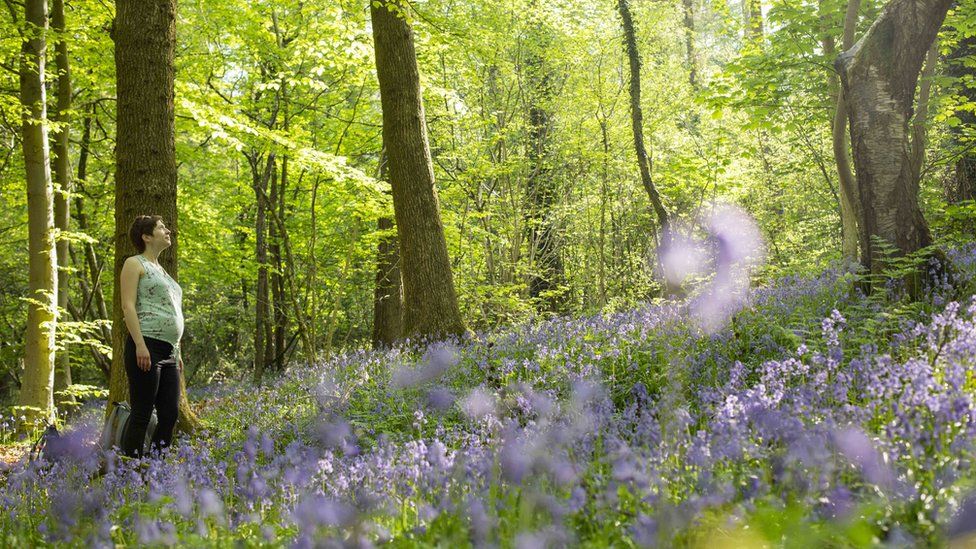Forest planting: Plan for trees across 'length of Wales'
- Published
- comments

Plans for a national forest running the length and breadth of Wales have been launched by the first minister.
Mark Drakeford said the scheme - which includes £15m of woodland creation grants - would help protect nature and boost tourism.
But opposition parties and environment charities warned Wales is lagging behind on targets to up tree cover.
The Welsh Government said its vision was for a "connected ecological network".
The plan, announced on Thursday, would see existing woodland joined up with newly planted areas.
The idea is that people would be able to walk the entire length of the forest, from one end of the country to the other, drawing inspiration from the Wales Coast Path which attracts millions of visitors a year.
No official map exists yet but meetings and events will be held over the coming months with businesses, landowners and communities to develop a plan for delivering the scheme.
On top of £5m allocated already in this year's budget, the first minister announced a further £10m of funding through Glastir grants for farmers and other land mangers to plant trees.
"We have a responsibility to future generations to protect nature from the dangers of our changing climate, but a healthy natural environment will also offer protection to our communities from the dangers we ourselves face," Mr Drakeford said.
The advantages include helping prevent flooding, improving air quality, removing harmful greenhouse gases from the atmosphere, regenerating soil for food and providing a home for wildlife, he added.
To launch the scheme, he visited Gnoll Country Park in Neath, where the Woodland Trust is currently creating the largest new woodland in the charity's history.
The site will become the latest to be used for the government's Plant! project, which sees a tree planted for every child born or adopted in Wales.
Natalie Buttriss, director of Wales for the Woodland Trust, said the charity hoped it would "provide an amazing place for people to enjoy healthy outdoor exercise" as well as helping deliver a "healthier, more resilient environment".
Environment Minister Lesley Griffiths, who also attended the launch, said creating extensive new networks of woodland was a "challenging and long-term ambition".
"In the coming year, we will be engaging widely so we are able to design the program in a way which allows everyone to make their contribution," she added.
Government opponents, as well as some environment charities, however, have urged swifter action to plant trees as part of efforts to tackle climate change.
The Welsh assembly's petitions committee has this week been discussing a submission by the Woodland Trust and Friends of the Earth, signed by more than 4,300 people, calling on ministers to up targets for new tree cover in Wales to 12,300 acres (5,000 hectares) a year.
What do farmers think?
While acknowledging farmers would welcome new funding, Glyn Roberts, president of the Farmers' Union of Wales, said he would not want to see trees planted "on a big scale in Wales", claiming it could have "a devastating effect on agriculture and rural life".
"If you take away the agricultural aspect of the land you take away the backbone of our rural areas - that creates an economy and allows people to live in these areas.
"We have to look at the broad picture and not focus on one element when we're talking about a complex issue like climate change. As farmers we have much more of an answer to the problem than people realise."
What do scientists say?
Prof Mary Gagen, of Swansea University, a climate scientist who specialises in trees, said she was pleased to hear a "genuinely positive announcement".
"It has the complexity that we need as it looks at the different elements to do with the emergency that we're facing both in our natural systems and our climate.
"But what's great is that this project also looks at habitat restoration, at retaining the trees we have at the moment, protecting our ancient forests and connecting areas so wildlife can use them."
Currently the government's ambition is to plant 4,900 acres (2000 hectares) a year, rising to 9,800 acres (4000 hectares) "as rapidly as possible".
But latest figures show Wales lags well behind the goal, with just 1,200 acres (520 hectares) of new woodland planted in 2018-19.
Advisers at the UK Committee on Climate Change have called for significant rises in tree planting if legally binding targets on cutting greenhouse gas emissions by 2050 are to be met.
Plaid Cymru AM Leanne Wood told the committee she was "disappointed" at what she claimed was a level of inaction by the Welsh Government on "one of the central political issues of our time".
"We've heard a lot about ambition and aims of big numbers of planting trees but we're talking about doing it over a very long period of time - that is not an emergency [response] - and we're in an emergency situation in terms of climate and flooding," she said.
What are the latest statistics on trees in Wales?
There were 763,000 acres (309,000 hectares) of woodland in Wales as of March 2019, representing 14.9% of the total land area.
There were a further 230,000 acres (92,700 hectares) of tree cover outside of woodlands (as of January 2016), found predominantly in agricultural landscapes, urban areas and transport corridors.
This means that approximately 19.4% of Welsh land area is covered by woodlands and trees.
It is estimated this soaks up 1.84 million tonnes of carbon dioxide equivalent (CO2e) each year.
Trees also help clean harmful pollutants from the air; it is estimated Welsh woodlands removed 16,211 tonnes of PM10 in 2015.
- Published5 September 2019
- Published21 January 2020
- Published16 November 2019
- Published30 July 2019